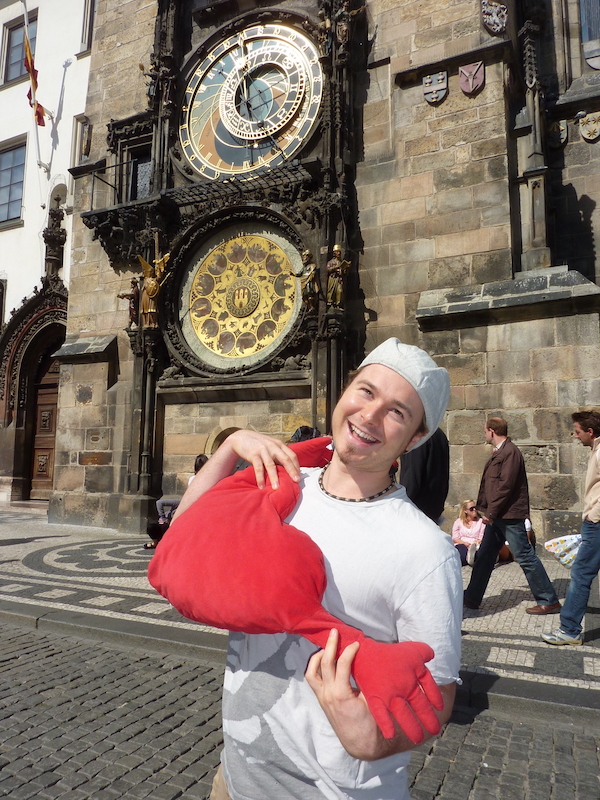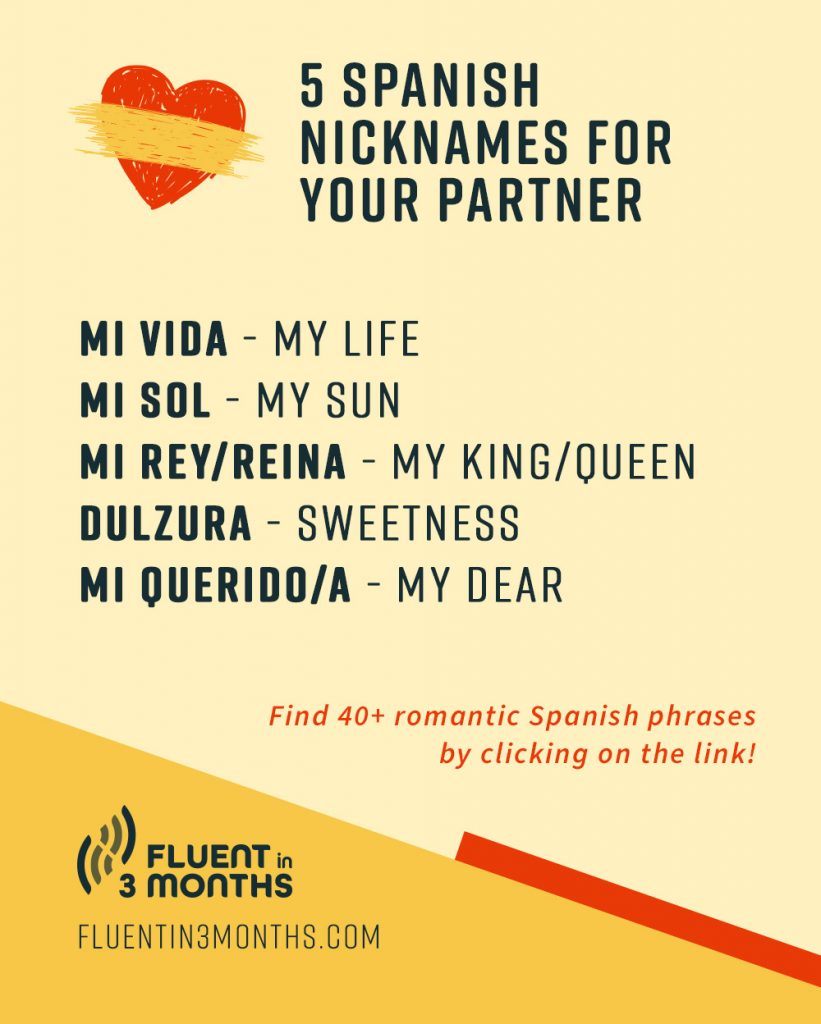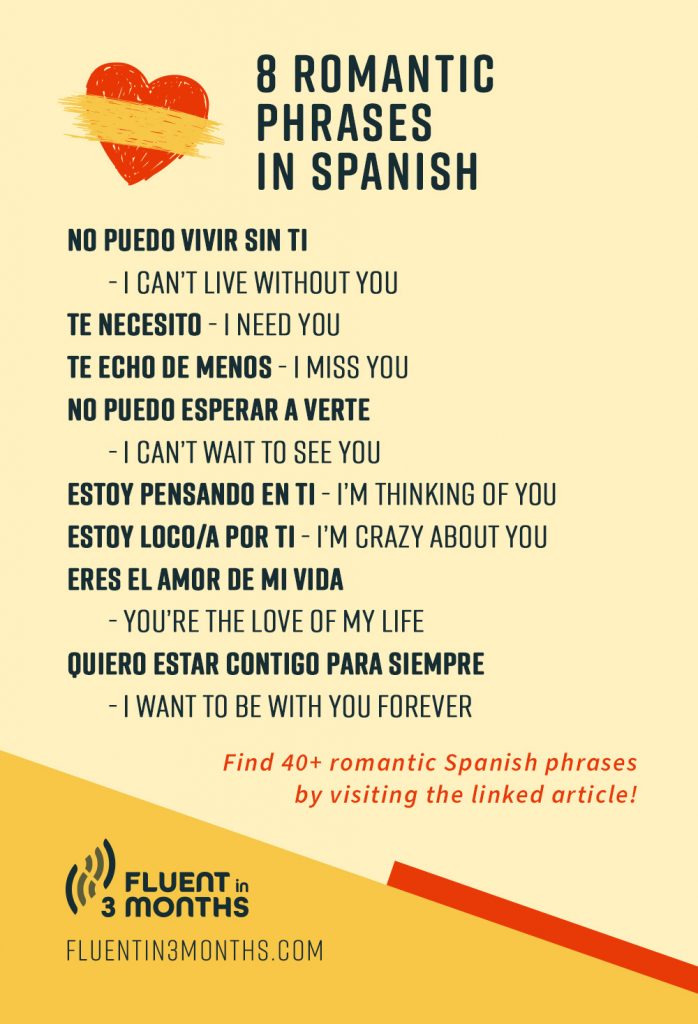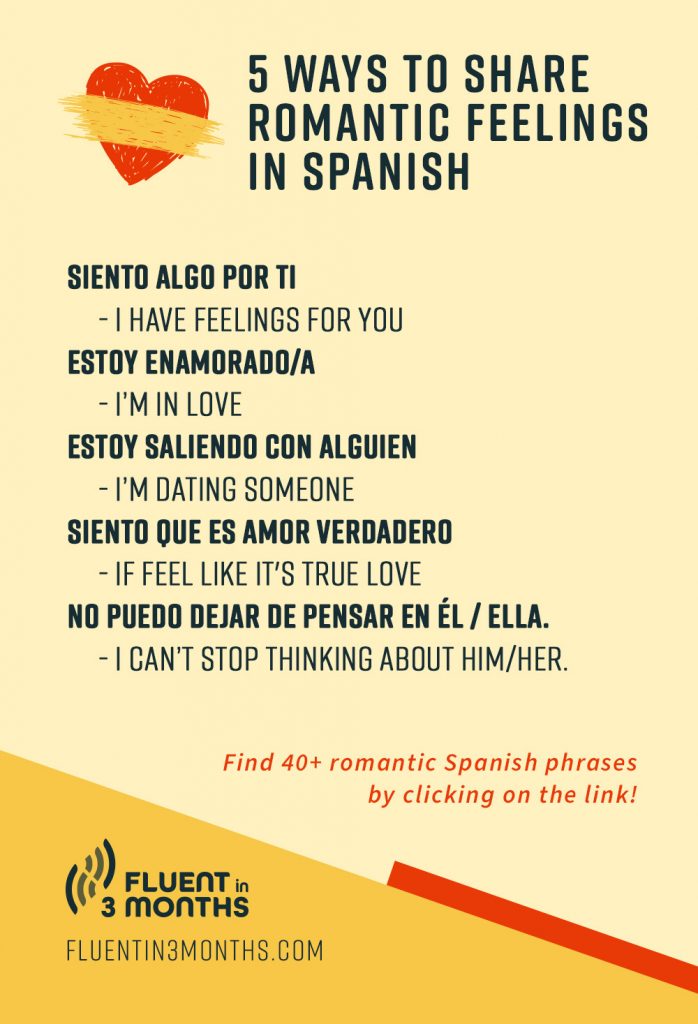How to Say “I Love You” in Spanish (and 50+ Other Romantic Phrases)
The Spanish language and culture are rich in passion and ways to express affection. But what’s the best way to tell someone “I love you” in Spanish?
After all, in English, we tend to overuse the word “love”. We love this show, and we love that book. We love our parents, our kids, and our spouses. We love our friends, we love our jobs.
And even though all of those forms of “love” are different, they’re expressed with the same word: “love”.
In Spanish, that’s not the case. There are many options for expressing your affection!
In fact, it’s one of the things I like about Spanish that English is missing. You can concisely share your like, love or even enchantment in Spanish, using different expressions.
Table of contents
- How to Say “I Love You” in Spanish
- How to Say “Beautiful” in Spanish
- How to Say “My Love” in Spanish
- How to Say “You’re My Other Half” in Spanish
- How to Say “My Heart” in Spanish
- How to Say “My Darling” in Spanish
- How to Say “Sexy” in Spanish
- How to Say “Cute” in Spanish
- How to Say “I Can’t Live Without You” in Spanish
- How to Say “Amazing” in Spanish
- You’re Ready to Be Romantic in Spanish!
Before we get into the article, if you are interested in learning Spanish yourself, you should check out my absolute favourite resource for learning Spanish, SpanishPod101.
Every time I refresh my Spanish, this has been by far my favourite resource, since it’s a podcast style learning resource that covers many aspects of the language much better than traditional courses do.
It also tackles the issue of listening comprehension better than literally anything else out there, since its catalogue of lessons eases you in with simple lessons at first that get progressively harder, and you can listen to them for a huge range of topics better suited to your hobbies and interests.
They have a free option for anyone who wants to test them out, based on just their limited recent episodes, but exclusively for Fi3M readers, you can get 20% off if you sign-up for any of their subscriptions, which allow you to access their full catalog of many hundreds of lessons, using the code FLUENT3.
I highly recommend this to all Spanish learners!!
How to Say “I Love You” in Spanish
As I mentioned above, saying “I love you” in Spanish depends on the context, situation and what or who you’re talking about.
Most people have learned that te amo means “I love you” in Spanish, and it does. But this is a very serious, deep love. It’s used mostly between spouses and when announcing your love, such as while proposing.
Another way to say “I love you” is te quiero. Here’s where those degrees of affection come in.
Te quiero literally means, “I want you,” but that’s a poor translation, in my opinion. This phrase doesn’t quite translate at all in English, because we have no equivalent at that degree.
To say “I want you” in English has a lusty sound to it, and is not very romantic. But in Spanish, a better translation is “I want you in my life.” It’s a step down from te amo, and usually said when you’re in a committed relationship, but not necessarily married (or at least, not yet).
And with both phrases, you can make them more passionate by adding mucho (“very much”). Te amo mucho or te quiero mucho both mean “I love you very much.”
If You’re Looking for Something More Low-Key, Here’s an Option
A less direct way to express your love is to say Significas mucho para mí. This means “You mean so much to me.”
Here are a couple more ways to express romantic affection in Spanish:
- Me gustas: “I like you”. The play-it-safe approach to expressing your affection in those early days of dating.
- Me caes bien: Also “I like you”. It’s a step down from me gustas, and more friendly.
- Me encantas: “I adore you” or “You enchant me”. It’s more romantic than me gustas and me caes bien, but it’s less serious than te quiero.
What about talking to family or friends? Usually, te quiero is for that kind of platonic love, or even affection for your pets. And if you’re wondering, “love” for things like objects or hobbies would be either me gusta (“I like”) or me encanta (“I’m enchanted by”, “I strongly like”).
How to Say “Beautiful” in Spanish
In Spanish, there are quite a few ways you can talk about someone’s beauty or attractiveness.
To say “beautiful” in Spanish, it’s hermosa or hermoso. This is the strongest way to say “beautiful” and it’s similar to “striking” or “gorgeous”.
Because hermosa is so strong, it’s more common to use bella or bello (“beautiful” or “lovely”), though. To just say “beauty” as a noun, it’s belleza.
To call someone “pretty”, you use bonita or bonito. This is more casual, almost like saying “You look nice” instead of “You look beautiful”. It’s still a nice compliment, though, and can be used to talk about anything.
And to say someone is “handsome” or “attractive”, you say guapo or guapa. It’s more common to hear women called bonita, and men guapo. But, unlike English, these terms aren’t gender exclusive. Sometimes guapo is also used to say someone or something is “cool”.
In Latin America, it’s most common to describe someone’s beauty as linda or lindo, which means “lovely”.
How to Say “My Love” in Spanish
To call someone “my love” in Spanish, you can say mi amor. You could also make the word cuter by adding the diminutives -ito. So mi amor becomes mi amorcito (“my little love”). It can be used for anyone, but it’s most often used for children to add cuteness.
Spanish has a lot of cutesy and romantic nicknames you could use if you want some variety. Here are a few:
- Mi vida: “My life”
- Mi sol: “My sun”
- Mi rey/reina: “My king/queen”
- Dulzura: “Sweetness”
- Mi querido/a: “My dear”
How to Say “You’re My Other Half” in Spanish
In Spanish, they have a sweet, unique phrase to tell someone “you’re my other half.” It’s eres mi media naranja, which translates as “you’re my half orange.” It’s best used for serious relationships, obviously, but it’s a cute and humorous way to say “my better half” like in English.
Why an orange? There are quite a few theories, but one explanation is that the dome of a church (cúpula or cimborrio) is also sometimes called media naranja. So it represents something beloved, a gift from heaven. Another theory is that every orange is different, and there can only be one perfect match for a half-orange.
Because it’s used to say someone is your perfect match, it’s also used to say “my soulmate”. But you could also use alma gemela (“soulmate”). That’s just a heavier way to say it, while media naranja is lighthearted.
It’s a fun expression… Even more when you learn that media in Spanish also means sock, primarily in Latin America. It’s a common pun to mean “you’re my orange sock” when using the phrase!
How to Say “My Heart” in Spanish
Another romantic way to express your love is to call someone “my heart”, which is mi corazón. There are a few romantic phrases we can use with this, too:
- Tienes todo mi corazón: “You have all my heart”
- Mi corazón es tuyo: “My heart is yours”
- Te amo con todo mi corazón: “I love you with all my heart”
- Mi corazón late por ti: “My heart beats for you”
Talk about sparking some romance!
How to Say “My Darling” in Spanish
In English, there are so many nicknames we call our lovers: darling, dear, babe, sweetheart. We’ve talked about some of them so far, but here are some other common nicknames for your loved one.
- Cariño: This is one of the most common nicknames you’ll hear. It has many different meanings: “sweetie”, “darling”, “dear”, “love”, “honey”, etc. It captures a lot of English nicknames in one.
- Cielo: It means “sky”, but it also translates as “heaven” or “paradise”. So you’re calling someone your own slice of heaven here on earth. It’s pretty romantic! Make it cuter with mi cielito (“my little heaven”).
- Bebé: “Baby” in Spanish, but essentially used the same as “babe” or “baby” in English when talking to your loved one. You could also use nena for “babe”.
How to Say “Sexy” in Spanish
“Sexy” in Spanish is the same as it is in English: sexy. Although, you’ll see it written as sexi as well because it’s a better fit for Spanish pronunciation and spelling.
If you want to call someone “hot”, though, don’t use caliente! Hot as we use it in English doesn’t directly translate to Spanish.
Caliente is used for hot food, yes, but when talking about a person? It means you’re horny, not “hot/sexy”.
Instead, there can be different terms that you can use, depending on the Hispanic region. Some will just say guapo/a, others would use ricura (although this one will likely get you a slap on the face if you don’t use it in the right situation).
How to Say “Cute” in Spanish
“Cute” in Spanish doesn’t have quite the exact translation. But there are a few ways you could get the same idea across.
Rico or rica is one way to say someone is “cute”, but it also means “sexy” or even “rich”. Sexy and cute don’t normally go together in English, but this word captures both.
Mono and mona also mean “cute” as an adjective, like “nice-looking”.
And linda or lindo, which we covered earlier, can also mean “cute”. Even listo, which means “ready”, “clever” or “prepared”, can also be used for cute.
How to Say “I Can’t Live Without You” in Spanish
Still looking for a different, special way to say how much you love someone? Here are some romantic phrases to express your love:
- No puedo vivir sin ti: “I can’t live without you”
- Te necesito: “I need you”
- Te echo de menos mi amor: “I miss you, my love”
- No puedo esperar a verte: “I can’t wait to see you”
- Estoy loco por ti: “I’m crazy about you”
- Quiero estar contigo para siempre: “I want to be with you forever”
- Estoy pensando en ti: “I’m thinking of you”
- Eres el amor de mi vida: “You’re the love of my life”
How to Say “Amazing” in Spanish
There isn’t only one way to say “amazing” in Spanish – there are a few words that work. You could use increíble (“incredible”), asombroso (“astounding”) or maravilloso (“marvellous”). All of them have similar meanings. So if you want to tell your loved one they’re amazing, say Eres increíble!
And if you want to know how to talk about your feelings, the word in Spanish is sentimientos – a “sentiment”.
You could say Siento algo por ti (“I have feelings for you”) or tengo sentimientos por ti, but the latter one would sound a bit strange. Sentimientos is more general feelings, not just loved ones, so using me encantas would sound more natural.
If you want to express those sentimientos though, these phrases can help:
- Estoy enamorada / enamorado: “I’m in love”
- Estoy saliendo con alguien: “I’m dating someone”
- Siento que es amor verdadero: “If feel like it’s true love”
- No puedo dejar de pensar en él / ella.: “I can’t stop thinking about him/her.”
And if you want to pop the big question in Spanish:
¿Te casarías conmigo? (“Will you marry me?”)
You’re Ready to Be Romantic in Spanish!
Whether it’s complimenting someone or sharing your feelings, you can now open your heart in Spanish.
If you want to share your love for languages, that’s great too! You should give the Language Hacking podcast a listen, that’s where all language lovers like you share their stories and talk about their favourite learning tips.
If want to browse more posts on the blog, here are some good options:









Social